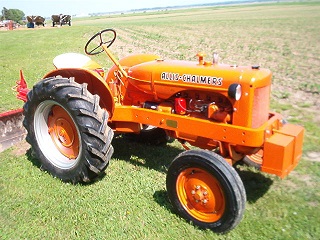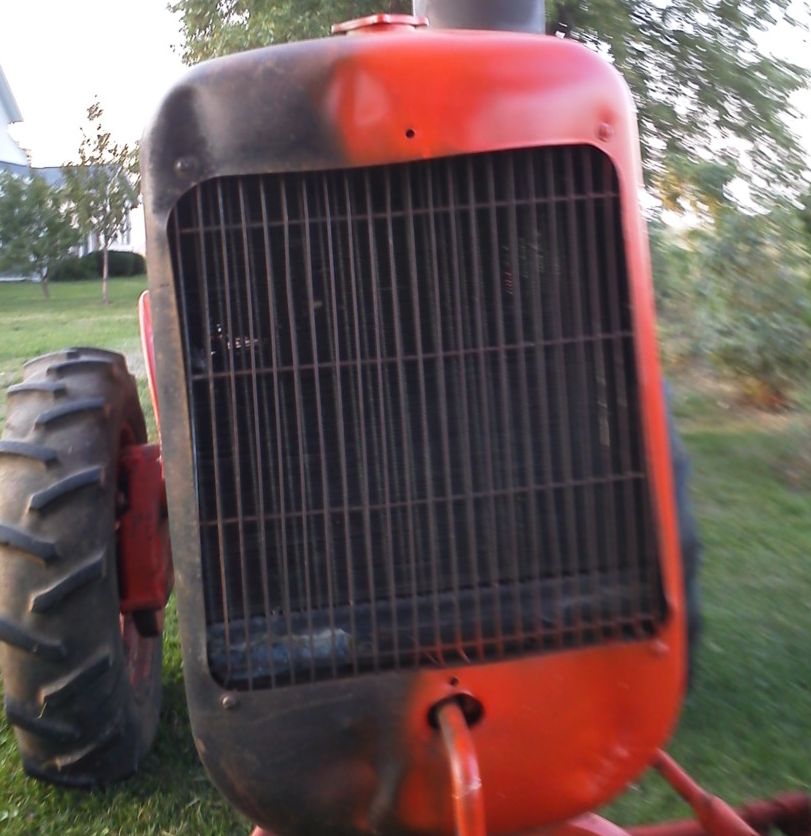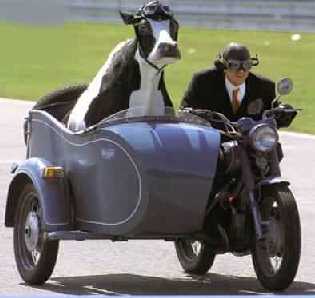| Author |
 Topic Search Topic Search  Topic Options Topic Options
|
vyvyjim 
Bronze Level


Joined: 11 Sep 2010
Location: WAUKESHA, WI
Points: 146
|
 Post Options Post Options
 Thanks(0) Thanks(0)
 Quote Quote  Reply Reply
 Topic: ethanol gas Topic: ethanol gas
Posted: 14 Oct 2010 at 7:24pm |
I'm restoring my first tractor, D17 series IV. Do I have to worry about using today's ethanol gas in it?
Jim
|
 |
|
Sponsored Links
|
|
 |
CTuckerNWIL 
Orange Level


Joined: 11 Sep 2009
Location: NW Illinois
Points: 22823
|
 Post Options Post Options
 Thanks(0) Thanks(0)
 Quote Quote  Reply Reply
 Posted: 14 Oct 2010 at 7:39pm Posted: 14 Oct 2010 at 7:39pm |
|
I have used ethanol in my 45 since it was available at the gas pump. I've never had a gas line freeze up and the tractor can set for 2-3 months without using a stabilizer. Never had an engine or carb problem.
|
|
|
 |
Stan R 
Orange Level Access

Joined: 03 Dec 2009
Location: MA
Points: 963
|
 Post Options Post Options
 Thanks(0) Thanks(0)
 Quote Quote  Reply Reply
 Posted: 14 Oct 2010 at 7:46pm Posted: 14 Oct 2010 at 7:46pm |
|
No problem in our D17 IV.
|
 |
clovis 
Orange Level

Joined: 11 Sep 2009
Points: 384
|
 Post Options Post Options
 Thanks(0) Thanks(0)
 Quote Quote  Reply Reply
 Posted: 14 Oct 2010 at 7:47pm Posted: 14 Oct 2010 at 7:47pm |
FWIW, the gas pumps at Shell and BPAmoco in our area are supposed to be ethanol free.
Our cars and equipment seem to run better on those two brands, and the MPG in our vehicles is higher.
|
 |
Ed in TX 
Orange Level


Joined: 11 Sep 2009
Location: Beaumont, Texas
Points: 400
|
 Post Options Post Options
 Thanks(0) Thanks(0)
 Quote Quote  Reply Reply
 Posted: 14 Oct 2010 at 8:12pm Posted: 14 Oct 2010 at 8:12pm |
About 2 years ago my company started selling this stuff. I don't jump on board with every new snake oil that comes along so I didn't push it on my customers. My competitors got it in the stores and the stuff has been selling through repeatedly. Now I'm seeing it in marine, lawn equipment and powersports stores. Walmart carries it too. The people who use it swear by it. I called the vendor and got a couple free bottles coming to try it out. Retails for about $8 a bottle.
|
 |
MBwcenll 
Bronze Level

Joined: 16 Sep 2009
Location: Chapin, IL
Points: 35
|
 Post Options Post Options
 Thanks(0) Thanks(0)
 Quote Quote  Reply Reply
 Posted: 14 Oct 2010 at 8:23pm Posted: 14 Oct 2010 at 8:23pm |
|
At out Corvette Convention we had a strong discussion using ethanol in the early Corvettes and related problems. Bottom line it seems the east coast has a problem with ethanol drawing moisture and eating up the inside of gas tanks. But, we have used ethanol blend ever sense it came out in our 1958 Vette and all our gas tractors, here in the midwest,without any problems. Never added anything to the gas. Besides we raise corn and we need the market for corn, right?
|
 |
morton(pa) 
Orange Level


Joined: 11 Sep 2009
Location: Lancaster, PA
Points: 1234
|
 Post Options Post Options
 Thanks(0) Thanks(0)
 Quote Quote  Reply Reply
 Posted: 14 Oct 2010 at 9:07pm Posted: 14 Oct 2010 at 9:07pm |
I have to agree with what MBwcenll said. Ethanol can draw moisture, and can harm engines if it sits for a while. Ethanol is just alcohol, and can even seperate and turn to jelly over a period of time, or so I've heard. I really don't like it. I really don't think the B runs right or as strong as it could with it in because ethanol only contains 60% energy of an equal amount of straight gas. I just don't like it. You deffiently don't want to have your engine sit for at least a month with it in its system, as I KNOW of engines that have been ruined from it. As far as I know, regular stabilizer does nothing to prevent the ethanol from harming the engine, it's formula was never changed from when it was developed for regular gasoline. I hate it, but thats just my opinion.
PS, check out the front page article about ethanol on the cover of USA Today. Right hand column of todays edition. It's interesting to say the least...us and the environmentalists might actually agree on something for once...
|
 |
steve(ill) 
Orange Level Access


Joined: 11 Sep 2009
Location: illinois
Points: 83032
|
 Post Options Post Options
 Thanks(0) Thanks(0)
 Quote Quote  Reply Reply
 Posted: 14 Oct 2010 at 10:08pm Posted: 14 Oct 2010 at 10:08pm |
|
I run ethanol in all 5 B tractors and have had no problems. I ran in in a 1989 F250 from new for 250k miles and NEVER had an injector problem. Now have a 2001 F150 with 210k miles and same results... it is a cleaner, but does drop milage slightly. Straight gas will get more MPG. WE have E85 in Illinois for 20 years.
|
|
Like them all, but love the "B"s.
|
 |
Brian Jasper co. Ia 
Orange Level

Joined: 11 Sep 2009
Location: Prairie City Ia
Points: 10508
|
 Post Options Post Options
 Thanks(0) Thanks(0)
 Quote Quote  Reply Reply
 Posted: 15 Oct 2010 at 6:51am Posted: 15 Oct 2010 at 6:51am |
I have run my CA on E85 with no problems. It also works well in my old small engines. For something that sees infrequent use, I would not allow the E85 to set in the carb bowl due to moisture condensation. Found that out with one of my small engines. Water condensed in the carb. All of the others that I had drained had no issues.
Ethanol blended fuel will have a shorter shelf life. Due to that, I always add a little Stabil to the fuel in my tractors.
|
|
"Any man who thinks he can be happy and prosperous by letting the government take care of him better take a closer look at the American Indian." Henry Ford
|
 |
Dave H 
Orange Level


Joined: 11 Sep 2009
Location: Central IL
Points: 3527
|
 Post Options Post Options
 Thanks(0) Thanks(0)
 Quote Quote  Reply Reply
 Posted: 15 Oct 2010 at 7:21am Posted: 15 Oct 2010 at 7:21am |
I assume the original post is referring to the 10% blend at the pumps. I have been using it for eons.
As far as ruining an engine, that is beyond me. I have two tractors that sit in the barn and seldom if ever get used. I put it on my spring things to do and drain the gas out of the tanks and run it thru my Z turn lawnmower and put fresh in the tractor tanks. Haven't had one small problem with it here in central IL in 8 years (that is how long I have been locasted at this place.) My favorite snake oils tht I add to the tank is Stabil and some two cycle oil.
I am not a chemist but don't understand all the sayings about alcohol "drawing" water. It seems that only so much vapor can be in the non fuel filled areas of carbs and tasnks, etc.
Ok now how about in the old days when everyone bought that stuff called heat and dumped it in the gas tanks when cold weather rolled around? That man with the big cowboy hat was peddling alcohol, wasn't he?
I am not saying that 10% blend is better than straight gas, but I am certainly saying that I don't have one issue or problem with it.
|
 |
DrAllis 
Orange Level Access

Joined: 12 Sep 2009
Points: 20980
|
 Post Options Post Options
 Thanks(0) Thanks(0)
 Quote Quote  Reply Reply
 Posted: 15 Oct 2010 at 7:27am Posted: 15 Oct 2010 at 7:27am |
|
I guess I'd like to know what was "ruined" on the alleged failed engines??? I've used 10% gasohol for 30 years and NEVER had 10 cents worth of trouble.....I've had six Ford F150's and have logged 1 million total miles on them with ZERO trouble. I do not use it in my lawn mower.
|
 |
CTuckerNWIL 
Orange Level


Joined: 11 Sep 2009
Location: NW Illinois
Points: 22823
|
 Post Options Post Options
 Thanks(0) Thanks(0)
 Quote Quote  Reply Reply
 Posted: 15 Oct 2010 at 9:04am Posted: 15 Oct 2010 at 9:04am |
|
My brother had a Merc outboard fail a couple years ago. I'm not sure what all was damaged in the engine but, the guy that fixed it for him told him that the ethanol blend was the reason it failed, no ifs ands or buts. This is how stories get spread around, blame it on the ethanol and a good percentage of people will believe it.
The fuel mix may have had something to do with the failure but I don't believe for a minute the only cause was the ethanol(10%) blend.
|
|
|
 |
DaveKamp 
Orange Level Access


Joined: 12 Apr 2010
Location: LeClaire, Ia
Points: 5829
|
 Post Options Post Options
 Thanks(0) Thanks(0)
 Quote Quote  Reply Reply
 Posted: 15 Oct 2010 at 9:08am Posted: 15 Oct 2010 at 9:08am |
|
Ethanol is hygroscopic- it absorbs moisture out of the air. It is also a compound which does not 'dissolve' in gasoline, it is in 'suspension'... if you take a sample, and let it sit in an open jar, alongside another sample of straight gasoline, and then do same with closed jars, you'll see a clear difference... the open samples- You'll see each sample 'layer' out, each differently according to the contents. Gasoline will evaporate, and eventually you'll be left with a little water and varnish (the additives and contaminants that don't evaporate). Water, trapped at the bottom, will be protected from evaporation because of the content layers above. Ethanol will absorb (and bind) with a considerable amount of water, so you''l actually have several sub-layers there. Finally, some 'layers' will burn differently from others. A gallon of some type of fuel will contain one quantity of heat energy per volume/wt unit, while another, will be more, or less. Comparing gasoline and diesel (hydrocarbon) fuels, there will typically be much more heat energy per unit than comparable quantity of a bio or ethanol (carbohydrate) fuel. This isn't a big deal to many, but realize that when an engine runs, the heat-energy is not only what causes internal combustion to work, it also defines the flame-speed and expansion rate inside the engine... this means that the engine's combustion performance is affected. In our old agricultural engines, it will go mostly unnoticed until you're really working a field hard.
There's a myriad of issues dealing with ANY motor fuel. The caustic nature of fuel blends means that SOME blends will attack system components. The moisture absorption properties means that some of what you have, will not be substantially flammable, and the mixture of components (hydrocarbon vs. carbohydrate fuels) will vary. Finally, the water trapped below, won't burn at all... and of course, it can freeze.
The #1 rule is: For best results, don't let ANY fuel sit for any length of time. Next: Make good use of that sediment bowl... empty it frequently. Next: If the engine isn't running right, DUMP all the fuel, and fill with fresh. The latter suggestion comes from a situation where a bulk tank had settled enough so that the fuel in the tank was essentially ALL ethanol/water. It is this condition where ethanol-blend fuels get blamed for substantial 'while running' engine damage. IF you adhere to Rule #1, it will never be a problem.
|
 |
mlpankey 
Orange Level

Joined: 13 Sep 2009
Location: Vols country
Points: 4580
|
 Post Options Post Options
 Thanks(0) Thanks(0)
 Quote Quote  Reply Reply
 Posted: 15 Oct 2010 at 10:27am Posted: 15 Oct 2010 at 10:27am |
 DaveKamp wrote: DaveKamp wrote:
Ethanol is hygroscopic- it absorbs moisture out of the air. It is also a compound which does not 'dissolve' in gasoline, it is in 'suspension'... if you take a sample, and let it sit in an open jar, alongside another sample of straight gasoline, and then do same with closed jars, you'll see a clear difference... the open samples- You'll see each sample 'layer' out, each differently according to the contents. Gasoline will evaporate, and eventually you'll be left with a little water and varnish (the additives and contaminants that don't evaporate). Water, trapped at the bottom, will be protected from evaporation because of the content layers above. Ethanol will absorb (and bind) with a considerable amount of water, so you''l actually have several sub-layers there. Finally, some 'layers' will burn differently from others. A gallon of some type of fuel will contain one quantity of heat energy per volume/wt unit, while another, will be more, or less. Comparing gasoline and diesel (hydrocarbon) fuels, there will typically be much more heat energy per unit than comparable quantity of a bio or ethanol (carbohydrate) fuel. This isn't a big deal to many, but realize that when an engine runs, the heat-energy is not only what causes internal combustion to work, it also defines the flame-speed and expansion rate inside the engine... this means that the engine's combustion performance is affected. In our old agricultural engines, it will go mostly unnoticed until you're really working a field hard.
There's a myriad of issues dealing with ANY motor fuel. The caustic nature of fuel blends means that SOME blends will attack system components. The moisture absorption properties means that some of what you have, will not be substantially flammable, and the mixture of components (hydrocarbon vs. carbohydrate fuels) will vary. Finally, the water trapped below, won't burn at all... and of course, it can freeze.
The #1 rule is: For best results, don't let ANY fuel sit for any length of time. Next: Make good use of that sediment bowl... empty it frequently. Next: If the engine isn't running right, DUMP all the fuel, and fill with fresh. The latter suggestion comes from a situation where a bulk tank had settled enough so that the fuel in the tank was essentially ALL ethanol/water. It is this condition where ethanol-blend fuels get blamed for substantial 'while running' engine damage. IF you adhere to Rule #1, it will never be a problem.
|
good job Dave kamp . a few years ago racers around here were jetting up their carbs and running 93 octane and 50 percent methanol . I tried to tell a few it didn't mix but they weren't accepted so i just started laughing when they started grumbling about how hard it was to keep the engine tuned.
|
 |
Dave in il 
Orange Level


Joined: 22 Sep 2009
Location: Manville Il
Points: 1748
|
 Post Options Post Options
 Thanks(0) Thanks(0)
 Quote Quote  Reply Reply
 Posted: 15 Oct 2010 at 1:48pm Posted: 15 Oct 2010 at 1:48pm |
Some carb gaskets and O rings were made from materials subject to damage by ethanol but that isn't really a problem with todays fuel systems or replacement carb kits. Sometimes the older fuel systems were "damaged" by the ethanol blends disolving crap in system and letting pile up causing blockages, etc.
Seems like anybody that doesn't know didly about engines jumps on the it's ethanol bandwagon. My daughter is going to school 6 hrs from home so when her car started acting up she had several people tell her to try different fuel. I told her it ran fine on 10% ethanol at home that's not it. Turned out to be a vacuum leak.
|
 |
Gerald J. 
Orange Level

Joined: 12 Sep 2009
Location: Hamilton Co, IA
Points: 5636
|
 Post Options Post Options
 Thanks(0) Thanks(0)
 Quote Quote  Reply Reply
 Posted: 15 Oct 2010 at 4:19pm Posted: 15 Oct 2010 at 4:19pm |
|
Methanol and ethanol are similar but enough different that methanol has historically been a lot more aggressive at dissolving plastics and rubbers used in fuel systems. One source of methanol is coal tar which has been handier out east than ethanol made from sugars of cane or corn in the corn belt. And so with shipping involved methanol has been used for a motor fuel additive with considerable destruction of gaskets and fuel lines. And there are a lot of schlock hoses out there. I've had several get soft and leak with or without ethanol in the past 20 years.
I was an early user of gasahol (we hoped it was always ethanol but that wasn't always true) and in my '73 pinto wagon I had to drop the gas tank and replace the gas gauge float that had sunk, probably from the gasahol. Still it ran fine. Modern computerized engines run better on ethanol than those with fixed jets because the computer can adjust the mix to compensate for the fuel mix.
My gas JD 4020 runs poorly on ethanol, probably because I don't have carburetor heat turned on because of a broken manifold. JD specifies it needs carb heat up to 90 if not plowing. That's loooong intake manifold that probably leads to much condensation towards the end ports.
Both methanol and ethanol are good at dissolving 20 to 50 years of varnish from tanks, sediment screens, and pipes and transporting them to the carbureter jets.
I have a military surplus generator that stopped running one year when it got a dose of gasahol that dissolved the varnish on the cork float and plugged the carburetor jets. That will be a mess to fix, if I ever attack it. These days SealALL is a good replacement for that varnish.
Gerald J.
|
 |
Dave(inMA) 
Orange Level


Joined: 12 Sep 2009
Location: Grafton, MA
Points: 2398
|
 Post Options Post Options
 Thanks(0) Thanks(0)
 Quote Quote  Reply Reply
 Posted: 15 Oct 2010 at 5:42pm Posted: 15 Oct 2010 at 5:42pm |
|
Great to read objective, carefully written material on this question. Thanks
|
|
WC, CA, D14, WD45
|
 |
mlpankey 
Orange Level

Joined: 13 Sep 2009
Location: Vols country
Points: 4580
|
 Post Options Post Options
 Thanks(0) Thanks(0)
 Quote Quote  Reply Reply
 Posted: 15 Oct 2010 at 5:47pm Posted: 15 Oct 2010 at 5:47pm |
 Gerald J. wrote: Gerald J. wrote:
Methanol and ethanol are similar but enough different that methanol has historically been a lot more aggressive at dissolving plastics and rubbers used in fuel systems. One source of methanol is coal tar which has been handier out east than ethanol made from sugars of cane or corn in the corn belt. And so with shipping involved methanol has been used for a motor fuel additive with considerable destruction of gaskets and fuel lines. And there are a lot of schlock hoses out there. I've had several get soft and leak with or without ethanol in the past 20 years.
I was an early user of gasohol (we hoped it was always ethanol but that wasn't always true) and in my '73 pinto wagon I had to drop the gas tank and replace the gas gauge float that had sunk, probably from the gasohol. Still it ran fine. Modern computerized engines run better on ethanol than those with fixed jets because the computer can adjust the mix to compensate for the fuel mix.
My gas JD 4020 runs poorly on ethanol, probably because I don't have carburetor heat turned on because of a broken manifold. JD specifies it needs carb heat up to 90 if not plowing. That's Long intake manifold that probably leads to much condensation towards the end ports.
Both methanol and ethanol are good at dissolving 20 to 50 years of varnish from tanks, sediment screens, and pipes and transporting them to the carburetor jets.
I have a military surplus generator that stopped running one year when it got a dose of gasohol that dissolved the varnish on the cork float and plugged the carburetor jets. That will be a mess to fix, if I ever attack it. These days Seal ALL is a good replacement for that varnish.
Gerald J.
|
methanol also attacks aluminum. I am not certain if ethanol does
|
 |









 Topic Options
Topic Options

 Post Options
Post Options Thanks(0)
Thanks(0)







 DaveKamp wrote:
DaveKamp wrote:
